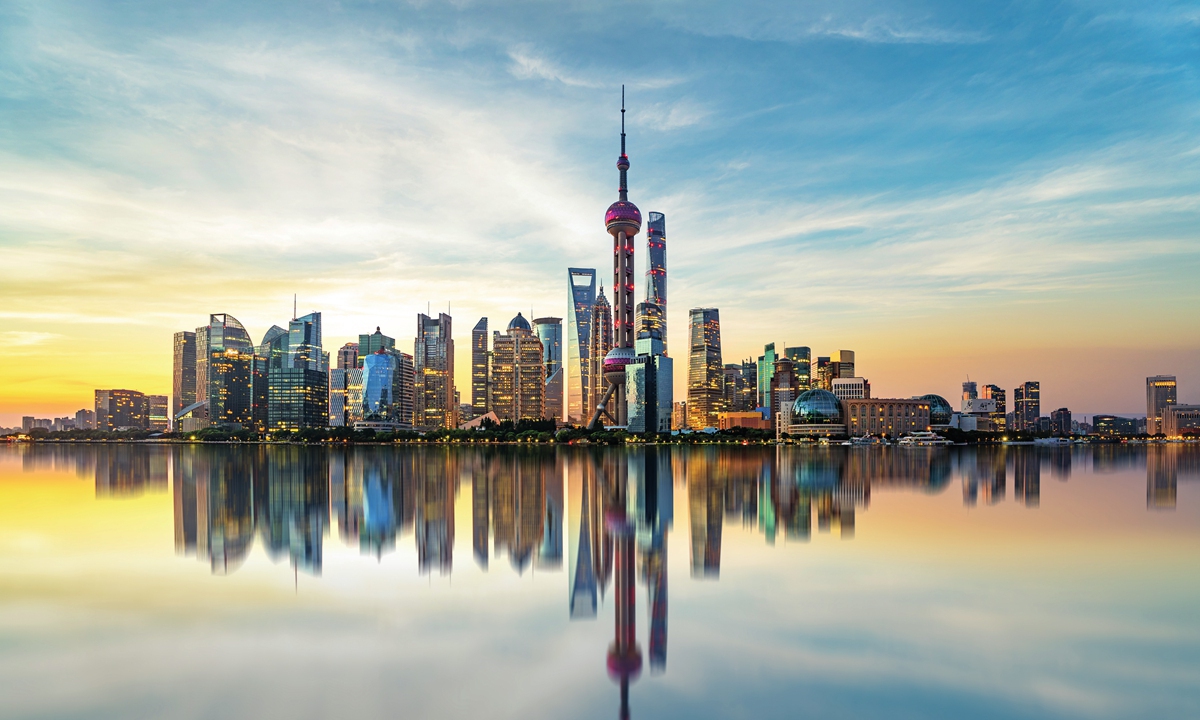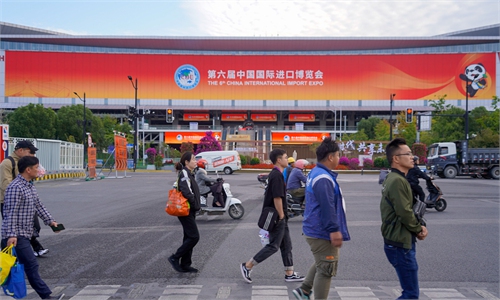
The skyline of Lujiazui in Shanghai Photo: CFP
China has been consistently ramping up efforts to improve business environment for all types of enterprises. Increasingly, foreign-invested companies have easier, more transparent and non-discriminatory "national treatment" - the same as Chinese firms, while doing business in the country.During recent years, China has taken coordinated measures to improve the business environment for foreign investment and promote institutional openness. Foreign businesses can now more easily access the Chinese market, thanks to measures such as the significant shortening of the "negative list" for overseas investors.
The country has been steadily attracting foreign direct investment (FDI) and maintaining a healthy economic growth rate because the government has kept widening institutional opening-up even amid the sluggish global growth and geopolitical volatilities. And, the leadership's commitment to high-standard opening-up and an improved business environment will continue to boost the confidence of all foreign investors.
For example, the government recently moved to relax requirements for on-arrival business visas, allowing foreigners travelling to China for business activities on short notice to apply for a business visa on arrival, rather than having to obtain one before travelling. Also, senior foreign management executives and technical personnel are suggested to get easier treatment while applying for permanent residence in China.
As a clear indication of the improvement in China's more equitable business operating environment, the country scored 77.9 points in 2022 in the ease of doing business, as ranked by the World Bank, in the same bracket with Spain, Austria and Japan. And, the ranking for China jumped to 31st place last year from 46th in 2022.
China's Foreign Investment Law, coming into effect four years ago, is a marked step in providing a legal framework and protection for foreign investments. In particular, the government has moved to shorten the "negative list" for foreign investment access seven times since 2013, removing all restrictions related to manufacturing, and further opened up the country's service sector. The items on the "negative list" for foreign investment have been reduced from 48 in 2018 to 31 at present. And for free trade zones, the items on the negative list for foreign investment have been reduced from the initial 190 to just 27.
And, the State Council, the cabinet, recently issued the "Opinions on Further Optimizing the Business Environment for Foreign Investment and Further Attracting Foreign Investment", which comprises 24 policy measures aimed at optimizing the utilization of foreign direct investment, and extending broad national treatment to foreign-invested enterprises in the country.
However, a number of Western politicians and media outlets have kept on spreading politically-driven allegations and malicious rumors such as "China's deteriorating investment environment" and "higher investment risks" inherent in the country's economic system.
They also accuse China's technological self-reliance efforts as "restrictive measures" against foreign businesses. Some Western pundits even claimed that China's focus on safeguarding national security would "frighten and deter" foreign investment, which is categorically untrue and ludicrous. These people's purpose is to keep foreign investors away from China, particularly in high-tech fields.
The West's sordid attempts to vilify and tarnish China's investment environment and denigrate China's economic development prospects appear to be part of a campaign orchestrated by the US, the UK and some of their close allies to expedite "re-shoring" or "friends-shoring" of manufacturing enterprises, and promote their "decoupling" or de-globalization schemes by muddying the waters of global opinion.
But it isn't easy to fool wise people. Recently, Saleh Ali Khabti, Deputy Minister of Investment of Saudi Arabia, lauded China's investment environment as "great" and cited the growth of Saudi companies' growing investments in China as evidence of the improved business environment.
China has been continuously improving its business environment. For instances, the transformation of southern Hainan Province into a free trade port, 60 times the area of Singapore has been noticed by businessmen all around the world. Also, the China International Import Expo, the only one of its kind in the world aimed at boosting imports to China, has been held annually for the last four years despite the pandemic. Its recent session in November attracted 3,500 companies from more than 120 countries to showcase their products and services, with deals valued at $78 billion clinched.
To improve business environment, further market access measures are announced by China. For example, all previous restrictions imposed on foreign investment in the manufacturing sector have been removed, and the financial services sector is being opened to overseas investment at an accelerated pace now.
China released a set of policy moves in late 2023 to improve market access in services, upgrading the mechanism for protecting the interests of all overseas investors, including intellectual property rights, and securing the participation of foreign investment enterprises in government procurement and setting of standards. And more importantly, in what may be named a systemic convergence move China aims to develop a fundamental system in international trade and investment that is in alignment with global best practices in rules and standards.
Nevertheless, for decades since the 1980's, foreign businesses were enjoying an unrivaled position in the Chinese market. Foreign brands, often considered superior to homegrown products, commanded a significant price premium. With the steady rise of Chinese manufacturing sector, however, foreign investors are also facing some competition from local firms.
The last few years have seen some foreign brands squeezed, not just in consumer goods sectors such as television sets, washing machines and refrigerators, but also in higher value added sectors, such as telecom equipment, engineering machinery, digital devices and robotics. In automobiles, roughly a decade ago foreign brands dominated China's market. But with rapid electric vehicle manufacturing, local EV brands like BYD, RIO and AION have largely outpaced foreign brands in terms of market share.
Some foreign brands have lost competitive edge in the Chinese market because of their lack of innovation. In China's highly competitive environment, only the fittest of foreign companies will survive and grow. Starbucks, with 6,500 shops under its belt in China, is opening a new shop every nine hours, and plans to open 9,000 shops by 2025, which will account for one-fourth of its shops worldwide. At the same time, Carrefour has languished, closing down one supermarket after another in recent years.
China has maintained its position as the world's second-largest recipient of foreign investment since 2017 and remains one of the most attractive investment destinations globally. "Innovating with China" has become an important strategy for some multinational companies to gain a competitive edge in the market. Many multinational companies have adopted development strategies such as "In China, for China" and "In China, for the world", while others have transitioned from initially importing products to manufacturing locally and exporting products overseas.
Since China's service sector market is massive in scale and has huge growth potential, foreign companies are interested in either investing in it or setting up service-providing businesses. No wonder the service sector now attracts the highest percentage of FDI. And, China needs to focus on improving the transparency of the service sector.
Over the past 40 years, the country has been proactive to align its opening-up with high international standards, continuous optimization of its investment policies, and persistent expansion of market access. China's approach to opening-up has been characterized by policy-driven opening-up, but now it is shifting toward institutional opening-up, with its main feature being the establishment of an open, transparent, stable and predictable system. This shift is expected to have a lasting impact on the confidence of both domestic and foreign participants, including foreign investors, and will promote the long-term development of Chinese economy.
The author is an editor with the Global Times. bizopinion@globaltimes.com.cn



